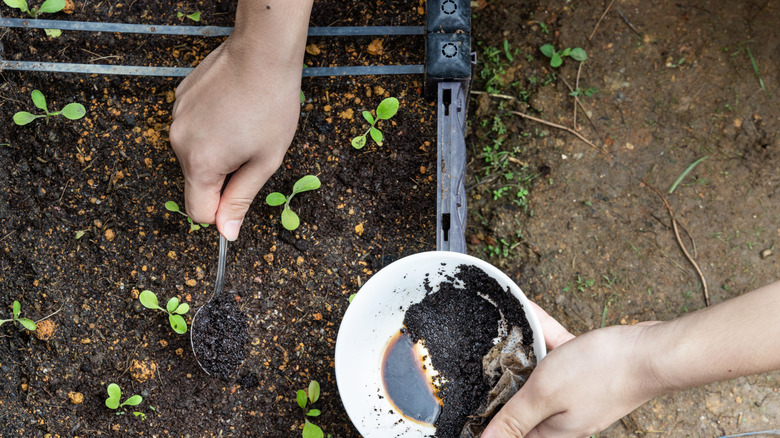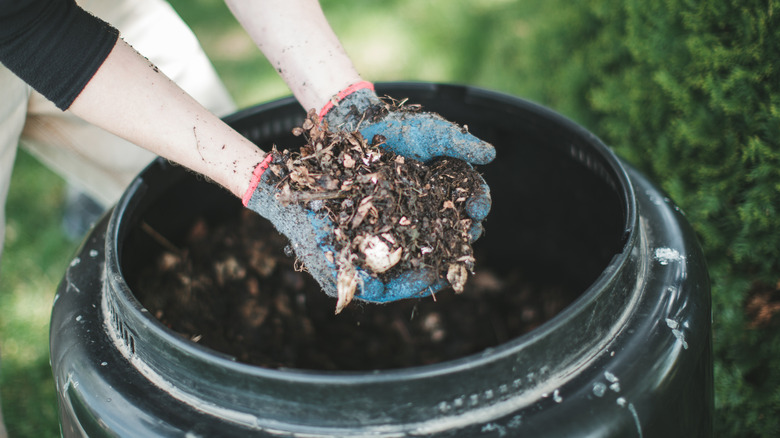The One Veggie In Your Garden You Should Be Saving Your Leftover Coffee Grounds For
There's no doubt that using spent coffee grounds in the garden is beneficial. Coffee grounds contain small amounts of nitrogen, potassium and phosphorus as well as trace amounts of micronutrients like iron and zinc. Adding them to the compost you use in your garden improves the soil by adding nutrients, improving water retention, and aerating the soil. Eggplant (Solanum melongena) is already a favorite crop for beginner and experienced gardeners alike thanks to its quick-growing nature, but you'll have an even higher chance of a fruitful harvest if you add a bit of java to your soil. According to a study conducted by students at STI College in Balayan, eggplants grown in soil amended with spent coffee grounds are significantly heavier in weight than eggplants grown without a coffee amendment (via Academia).
Introducing coffee grounds into your garden has dual benefits. Not only will they provide nutrients to plants that help them grow bigger and heavier, they also kill garden slugs, slimy pests with long, tapered bodies, that feed on all parts of eggplant and are attracted to your garden by a few common mistakes. Slugs kill seedlings, chew holes in leaves, and attack the fruit. If you see shiny trails on your vegetables, or holes in the leaves and fruit, you may have slugs. It's the caffeine in the coffee grounds that's the secret weapon against slug attacks on your solanaceous vegetables. The pests eat the grounds, and the caffeine kills them. If you're not a coffee drinker, your local coffee shop may be happy to share their used grounds — just make sure you ask for caffeinated, not decaf.
Introducing leftover coffee grounds into the garden
Coffee grounds can be worked into the soil around the vegetables or added to compost, but don't overdo it. Too much coffee dug into the soil can slow down plant growth and have a negative effect on seed germination. There are no specific formulas for how much coffee to use in your garden, but sprinkling 1 cup of used grounds directly into the soil for each 25 feet of garden row is a good starting point. Scatter the grounds around the plants and then use a hoe or hand cultivator to work them into the ground.
Spent coffee grounds help sustain high temperatures in compost, killing unwanted seeds that may make their way into the compost bin and helping eliminate unwanted microorganisms that carry diseases. For compost, limit the coffee grounds to 20% to 25% of the total mix, and combine it with other DIY mulch ingredients like dead leaves, straw and grass clippings. You can either use compost as a mulch, spreading 2 to 4 inches on top of the soil, or you can work it into the top 6 to 9 inches of soil to use as an amendment.
Another highly effective way to use coffee to kill pests is to mix one part water with two parts brewed coffee, then use the solution to drench the soil around the vegetables. For slugs on leaves, make a spray of 9 parts of water to 1 part brewed coffee. Test the spray on a couple of leaves, and if they don't show any damage, spray the rest of the crop.

